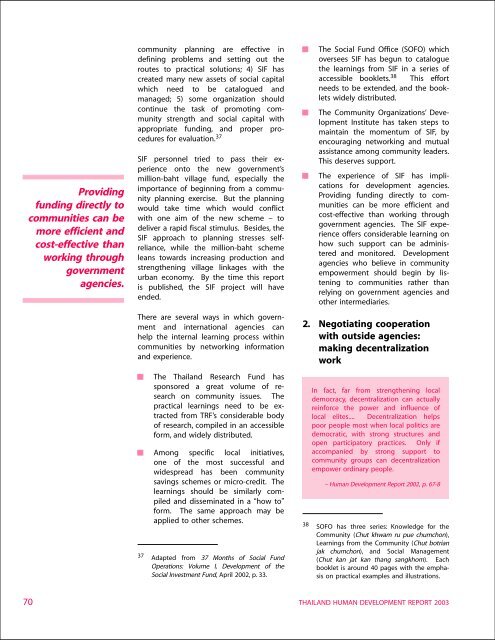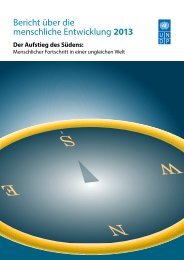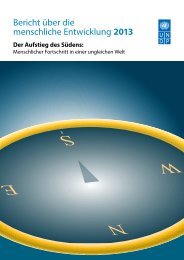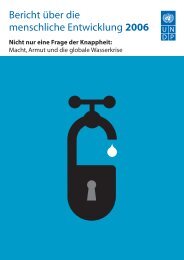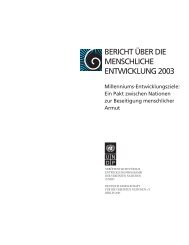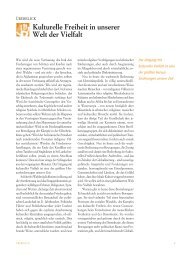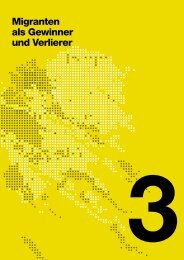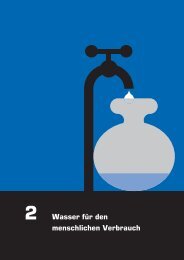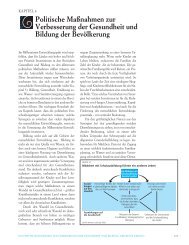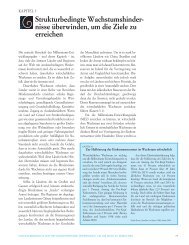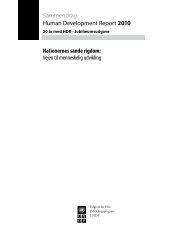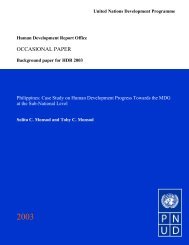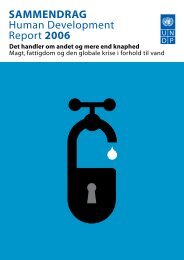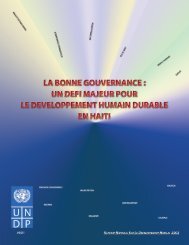THAILAND HUMAN DEVELOPMENT REPORT 2003
THAILAND HUMAN DEVELOPMENT REPORT 2003
THAILAND HUMAN DEVELOPMENT REPORT 2003
You also want an ePaper? Increase the reach of your titles
YUMPU automatically turns print PDFs into web optimized ePapers that Google loves.
Providing<br />
funding directly to<br />
communities can be<br />
more efficient and<br />
cost-effective than<br />
working through<br />
government<br />
agencies.<br />
70<br />
community planning are effective in<br />
defining problems and setting out the<br />
routes to practical solutions; 4) SIF has<br />
created many new assets of social capital<br />
which need to be catalogued and<br />
managed; 5) some organization should<br />
continue the task of promoting community<br />
strength and social capital with<br />
appropriate funding, and proper procedures<br />
for evaluation. 37<br />
SIF personnel tried to pass their experience<br />
onto the new government’s<br />
million-baht village fund, especially the<br />
importance of beginning from a community<br />
planning exercise. But the planning<br />
would take time which would conflict<br />
with one aim of the new scheme – to<br />
deliver a rapid fiscal stimulus. Besides, the<br />
SIF approach to planning stresses selfreliance,<br />
while the million-baht scheme<br />
leans towards increasing production and<br />
strengthening village linkages with the<br />
urban economy. By the time this report<br />
is published, the SIF project will have<br />
ended.<br />
There are several ways in which government<br />
and international agencies can<br />
help the internal learning process within<br />
communities by networking information<br />
and experience.<br />
The Thailand Research Fund has<br />
sponsored a great volume of research<br />
on community issues. The<br />
practical learnings need to be extracted<br />
from TRF’s considerable body<br />
of research, compiled in an accessible<br />
form, and widely distributed.<br />
Among specific local initiatives,<br />
one of the most successful and<br />
widespread has been community<br />
savings schemes or micro-credit. The<br />
learnings should be similarly compiled<br />
and disseminated in a “how to”<br />
form. The same approach may be<br />
applied to other schemes.<br />
37 Adapted from 37 Months of Social Fund<br />
Operations: Volume I, Development of the<br />
Social Investment Fund, April 2002, p. 33.<br />
The Social Fund Office (SOFO) which<br />
oversees SIF has begun to catalogue<br />
the learnings from SIF in a series of<br />
accessible booklets. 38 This effort<br />
needs to be extended, and the booklets<br />
widely distributed.<br />
The Community Organizations’ Development<br />
Institute has taken steps to<br />
maintain the momentum of SIF, by<br />
encouraging networking and mutual<br />
assistance among community leaders.<br />
This deserves support.<br />
The experience of SIF has implications<br />
for development agencies.<br />
Providing funding directly to communities<br />
can be more efficient and<br />
cost-effective than working through<br />
government agencies. The SIF experience<br />
offers considerable learning on<br />
how such support can be administered<br />
and monitored. Development<br />
agencies who believe in community<br />
empowerment should begin by listening<br />
to communities rather than<br />
relying on government agencies and<br />
other intermediaries.<br />
2. Negotiating cooperation<br />
with outside agencies:<br />
making decentralization<br />
work<br />
In fact, far from strengthening local<br />
democracy, decentralization can actually<br />
reinforce the power and influence of<br />
local elites.... Decentralization helps<br />
poor people most when local politics are<br />
democratic, with strong structures and<br />
open participatory practices. Only if<br />
accompanied by strong support to<br />
community groups can decentralization<br />
empower ordinary people.<br />
– Human Development Report 2002, p. 67-8<br />
38 SOFO has three series: Knowledge for the<br />
Community (Chut khwam ru pue chumchon),<br />
Learnings from the Community (Chut botrian<br />
jak chumchon), and Social Management<br />
(Chut kan jat kan thang sangkhom). Each<br />
booklet is around 40 pages with the emphasis<br />
on practical examples and illustrations.<br />
<strong>THAILAND</strong> <strong>HUMAN</strong> <strong>DEVELOPMENT</strong> <strong>REPORT</strong> <strong>2003</strong>


